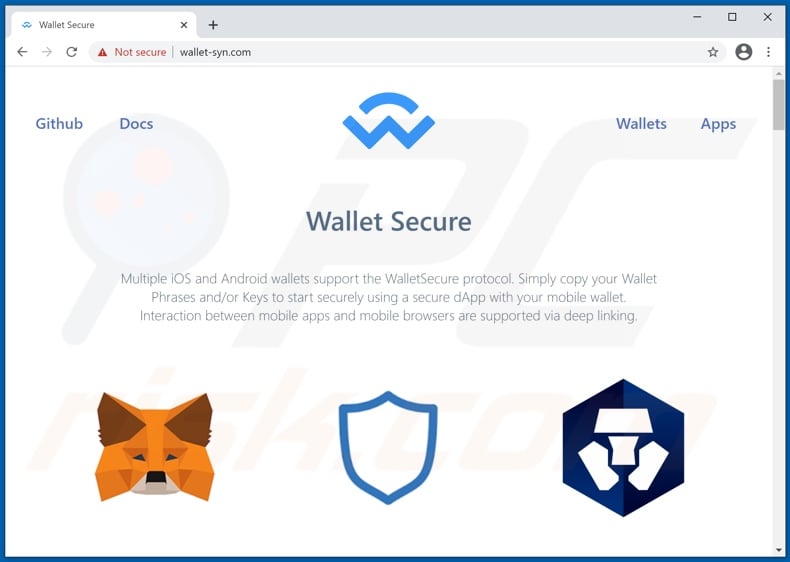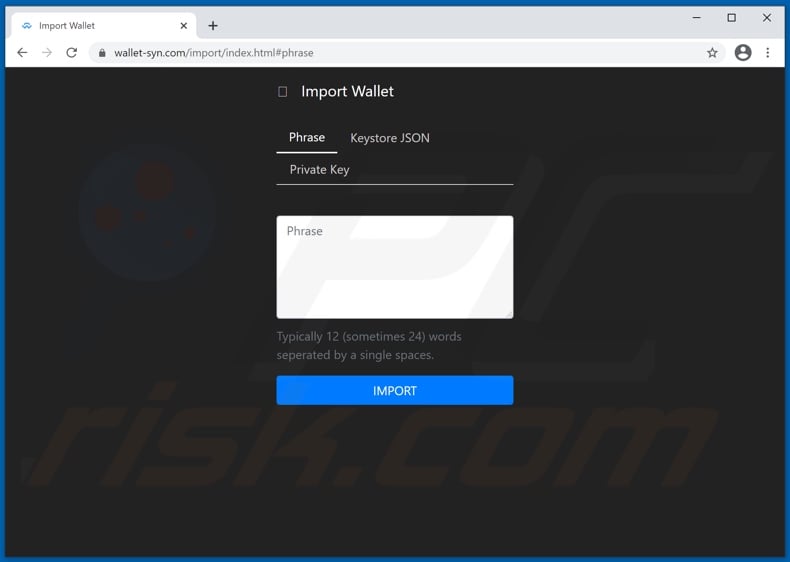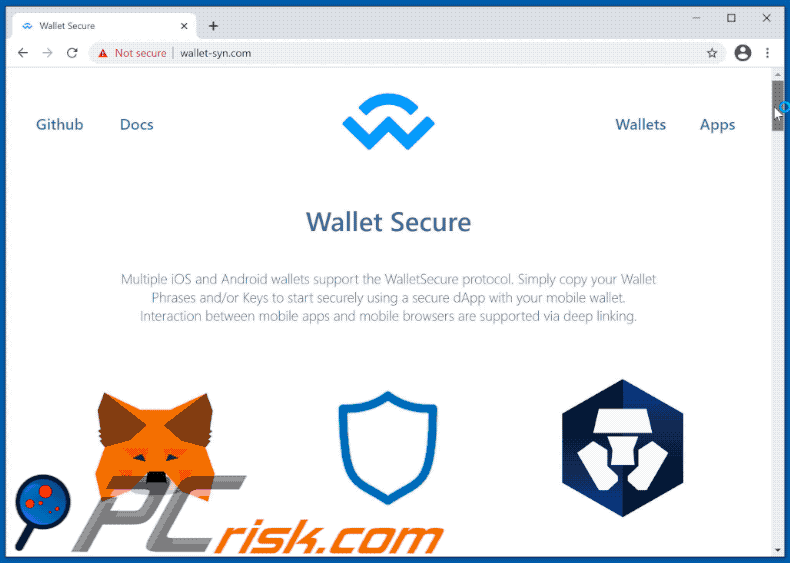Avoid having your cryptowallet stolen by the "Wallet Secure" scam
Phishing/ScamAlso Known As: Wallet Secure scam website
Get free scan and check if your device is infected.
Remove it nowTo use full-featured product, you have to purchase a license for Combo Cleaner. Seven days free trial available. Combo Cleaner is owned and operated by RCS LT, the parent company of PCRisk.com.
What is "Wallet Secure"?
"Wallet Secure" is a scam promoted on various deceptive web pages. The scheme is presented as a service designed to store and securely connect digital wallets. through the "Wallet Secure" scam - victims' wallet credentials are extracted, which are then used to gain access and control over the wallets.
By trusting "Wallet Secure" users risk having their digital wallets stolen and experiencing financial loss.
These untrusted/deceptive websites are typically accessed unintentionally. They are commonly entered through mistyped URLs or redirects caused by intrusive advertisements or installed Potentially Unwanted Applications (PUAs). This software does not require explicit permission to infiltrate systems, and thus users may be unaware of its presence.

The "Wallet Secure" scam asks users to provide their digital and cryptocurrency wallet private keys and secret phrases (i.e., security/recovery phrases) to store the information and connect the wallets safely.
The scheme claims to support the following digital wallets and cryptowallets: MetaMask, Trust Wallet, DeFi, AAVE Wallet, Enjin, MEW (MyEtherWallet), Digitex Wallet, Coinbase, imToken, ONTO, TokenPocket, MathWallet, BitPay, Ledger Live, WallETH, Authereum, MYKEY, TrustVault, Atomic, Coin98, CoolWallet S, D'CENT Wallet, Coinomi, GridPlus, CYBAVO Wallet, SafePal, Infinito, wallet.io, Infinity Wallet, Ownbit, EasyPocket, SparkPoint, ViaWallet, BitKeep, Vision, PEAKDEFI Wallet, XDC Wallet, Unstoppable, MEET.ONE, Dok Wallet, AT.Wallet, Blockchain.com Wallet, Squarelink, Ledger Wallet, Trevor, Fortmatic, and Portis.
This fake service records the above data, which allows scammers to steal the victims' wallets, hence allowing them control over the stored cryptocurrency. The "Wallet Secure" scheme poses a serious threat to the safety of users' digital wallets, thereby endangering their finance account security.
PUAs are prime suspects behind rogue redirects to dubious/malicious sites (e.g., ones promoting the "Wallet Secure" scam), however, these applications can have other dangerous functionalities.
Adware-types run intrusive advertisement campaigns. In other words, this software delivers pop-ups, banners, coupons, and other intrusive ads. As well as severely diminishing the browsing experience, the ads pose a threat to device/user safety.
When clicked, intrusive advertisements redirect to dangerous websites and some can stealthily download/install content. Other PUAs called browser hijackers operate by modifying browser settings and limiting/denying access to them in order to promote fake search engines.
The promoted web searchers seldom provide search results, and so they tend to redirect to Google, Bing, Yahoo, and other legitimate search engines.
Furthermore, most PUAs (regardless of type) have data tracking capabilities. They monitor browsing activity (URLs visited, webpages viewed, search queries typed, etc.) and collect vulnerable data extracted from it (IP addresses, geolocations, and even personally identifiable information).
The collected data is then monetized by sharing with and/or selling to third-parties (potentially, cyber criminals).
In summary, the presence of unwanted apps on devices can lead to system infections, financial losses, serious privacy issues, and identity theft.
To ensure device integrity and user privacy, it is crucial to remove all suspicious applications and browser extensions/plug-ins immediately upon detection.
| Name | Wallet Secure scam website |
| Threat Type | Phishing, Scam, Social Engineering, Fraud |
| Fake Claim | Scam claims to connect digital wallets and safely store the information associated with them. |
| Related Domains | wallet-syn[.]com |
| Detection Names (wallet-syn[.]com) | Emsisoft (Phishing), Fortinet (Phishing), Netcraft (Malicious), Full List Of Detections (VirusTotal) |
| Serving IP Address (wallet-syn[.]com) | 162.0.232.190 |
| Symptoms | Fake error messages, fake system warnings, pop-up errors, hoax computer scan. |
| Distribution methods | Compromised websites, rogue online pop-up ads, potentially unwanted applications. |
| Damage | Loss of sensitive private information, monetary loss, identity theft, possible malware infections. |
| Malware Removal (Windows) |
To eliminate possible malware infections, scan your computer with legitimate antivirus software. Our security researchers recommend using Combo Cleaner. Download Combo CleanerTo use full-featured product, you have to purchase a license for Combo Cleaner. 7 days free trial available. Combo Cleaner is owned and operated by RCS LT, the parent company of PCRisk.com. |
The internet is full of various scams and other deceptive content. "Cardano Giveaway", "Double Your Bitcoins", "Doge Giveaway", and "BTC Giveaway" are some examples of other cryptocurrency-centered schemes.
The sole purpose of these scams is to generate revenue for their designers, but how this is attained varies. Popular scam models are: "amazing" offers and deals, fake giveaways and prize raffles, alerts that an essential piece of software is outdated or missing, warnings that the device is infected, and so on. Due to the widespread nature of online scams, you are strongly advised to exercise caution when browsing.
How did potentially unwanted applications install on my computer?
Browser hijackers, adware-type apps, and other types of PUAs are commonly distributed by integrating them into the download and/or installation set-ups of other programs, so that a proportion of users inadvertently download and install them together with their chosen software. This distribution method is known as "bundling".
Offers to download and install additionally-included apps usually appear in "Advanced", "Custom" and other settings of the set-ups (where they can usually be declined). Many users fail to check and change these settings, thereby granting permission for PUAs to be downloaded and installed by default.
In addition, unwanted downloads and installations are sometimes caused by clicking deceptive advertisements capable of executing certain scripts.
How to avoid installation of potentially unwanted applications
You are advised to research all software before download/installation or purchase. All downloads must be done from official and verified sources, since dubious channels such as unofficial and free file-hosting websites, Peer-to-Peer sharing networks and other third party downloaders commonly offer deceptive or bundled content.
When downloading/installing, read the terms, explore all possible options, use the "Custom/Advanced" settings and opt-out of supplementary apps, tools, features, etc. Intrusive ads may seem normal and harmless, however, they can redirect to various dubious web pages (e.g. gambling, pornography, adult-dating, and many others).
If you encounter ads or redirects of this kind, inspect the system and remove any suspicious applications and browser extensions/plug-ins immediately.
If your computer is already infected with PUAs, we recommend running a scan with Combo Cleaner Antivirus for Windows to automatically eliminate them.
Screenshot of the "Wallet Secure" scam asking users to enter their digital wallet private keys and secret phrases:

The appearance of "Wallet Secure" pop-up scam (GIF):

Instant automatic malware removal:
Manual threat removal might be a lengthy and complicated process that requires advanced IT skills. Combo Cleaner is a professional automatic malware removal tool that is recommended to get rid of malware. Download it by clicking the button below:
DOWNLOAD Combo CleanerBy downloading any software listed on this website you agree to our Privacy Policy and Terms of Use. To use full-featured product, you have to purchase a license for Combo Cleaner. 7 days free trial available. Combo Cleaner is owned and operated by RCS LT, the parent company of PCRisk.com.
Quick menu:
- What is Wallet Secure scam website?
- How to identify a pop-up scam?
- How do pop-up scams work?
- How to remove fake pop-ups?
- How to prevent fake pop-ups?
- What to do if you fell for a pop-up scam?
How to identify a pop-up scam?
Pop-up windows with various fake messages are a common type of lures cybercriminals use. They collect sensitive personal data, trick Internet users into calling fake tech support numbers, subscribe to useless online services, invest in shady cryptocurrency schemes, etc.
While in the majority of cases these pop-ups don't infect users' devices with malware, they can cause direct monetary loss or could result in identity theft.
Cybercriminals strive to create their rogue pop-up windows to look trustworthy, however, scams typically have the following characteristics:
- Spelling mistakes and non-professional images - Closely inspect the information displayed in a pop-up. Spelling mistakes and unprofessional images could be a sign of a scam.
- Sense of urgency - Countdown timer with a couple of minutes on it, asking you to enter your personal information or subscribe to some online service.
- Statements that you won something - If you haven't participated in a lottery, online competition, etc., and you see a pop-up window stating that you won.
- Computer or mobile device scan - A pop-up window that scans your device and informs of detected issues - is undoubtedly a scam; webpages cannot perform such actions.
- Exclusivity - Pop-up windows stating that only you are given secret access to a financial scheme that can quickly make you rich.
Example of a pop-up scam:

How do pop-up scams work?
Cybercriminals and deceptive marketers usually use various advertising networks, search engine poisoning techniques, and shady websites to generate traffic to their pop-ups. Users land on their online lures after clicking on fake download buttons, using a torrent website, or simply clicking on an Internet search engine result.
Based on users' location and device information, they are presented with a scam pop-up. Lures presented in such pop-ups range from get-rich-quick schemes to fake virus scans.
How to remove fake pop-ups?
In most cases, pop-up scams do not infect users' devices with malware. If you encountered a scam pop-up, simply closing it should be enough. In some cases scam, pop-ups may be hard to close; in such cases - close your Internet browser and restart it.
In extremely rare cases, you might need to reset your Internet browser. For this, use our instructions explaining how to reset Internet browser settings.
How to prevent fake pop-ups?
To prevent seeing pop-up scams, you should visit only reputable websites. Torrent, Crack, free online movie streaming, YouTube video download, and other websites of similar reputation commonly redirect Internet users to pop-up scams.
To minimize the risk of encountering pop-up scams, you should keep your Internet browsers up-to-date and use reputable anti-malware application. For this purpose, we recommend Combo Cleaner Antivirus for Windows.
What to do if you fell for a pop-up scam?
This depends on the type of scam that you fell for. Most commonly, pop-up scams try to trick users into sending money, giving away personal information, or giving access to one's device.
- If you sent money to scammers: You should contact your financial institution and explain that you were scammed. If informed promptly, there's a chance to get your money back.
- If you gave away your personal information: You should change your passwords and enable two-factor authentication in all online services that you use. Visit Federal Trade Commission to report identity theft and get personalized recovery steps.
- If you let scammers connect to your device: You should scan your computer with reputable anti-malware (we recommend Combo Cleaner Antivirus for Windows) - cyber criminals could have planted trojans, keyloggers, and other malware, don't use your computer until removing possible threats.
- Help other Internet users: report Internet scams to Federal Trade Commission.
Share:

Tomas Meskauskas
Expert security researcher, professional malware analyst
I am passionate about computer security and technology. I have an experience of over 10 years working in various companies related to computer technical issue solving and Internet security. I have been working as an author and editor for pcrisk.com since 2010. Follow me on Twitter and LinkedIn to stay informed about the latest online security threats.
PCrisk security portal is brought by a company RCS LT.
Joined forces of security researchers help educate computer users about the latest online security threats. More information about the company RCS LT.
Our malware removal guides are free. However, if you want to support us you can send us a donation.
DonatePCrisk security portal is brought by a company RCS LT.
Joined forces of security researchers help educate computer users about the latest online security threats. More information about the company RCS LT.
Our malware removal guides are free. However, if you want to support us you can send us a donation.
Donate
▼ Show Discussion